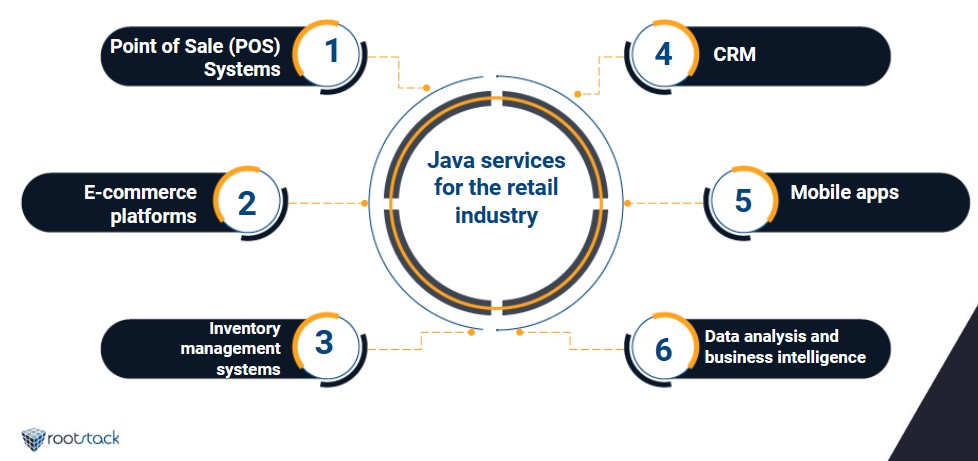
Services for Java development in the retail business
July 12, 2023
Table of contents
Quick Access
Java is the most common programming language and the foundation for the majority of the online pages we visit on a regular basis, including numerous focused on electronic commerce, platforms belonging to corporations in the retail industry.
The retail or retail sales industry was among the first to capitalize on the benefits of technology and the internet, eventually dominating the field of online sales and permanently changing the way we buy items.
What is Java
Before learning how this programming language can be used, let's explain Java. "Java is a widely used programming language for coding web applications. It has been a popular choice among developers for more than two decades, with millions of Java applications in use today" according to Amazon.
Java is a network-centric, object-oriented, cross-platform language that can be used as a platform in itself. It is a fast, secure, and reliable programming language for coding everything from mobile apps and enterprise software to big data applications and server-side technologies,” they continue.
Its key features are:
- Object oriented
- Platform independence
- Strong standard library
- Memory management
- Security
- Multi-threaded
- Wide range of applications

Java solutions for the retail sector
Java is a popular programming language that is used to create a variety of applications, including those used in the retail business. Java provides a stable and scalable platform for developing enterprise-level software solutions. Here are a few Java development services that are often utilized in the retail industry:
POS (Point of Sale) Systems
Java may be used to create efficient and secure retail POS systems. Inventory management, sales monitoring, payment processing, and customer relationship management are all handled by these systems.
Platforms for E-Commerce
Because of its flexibility and resilience, Java is a great choice for designing e-commerce applications. Spring and Hibernate are Java frameworks that may be used to create safe, scalable, and feature-rich online businesses with capabilities such as product catalog management, shopping cart functionality, payment integration, and order processing.
Inventory Control Systems
To maintain stock levels, automate reorder operations, and manage supply chain activities, retail businesses frequently demand efficient inventory management solutions. By interacting with barcode readers, RFID devices, and other hardware, Java-based programs can be modified to fulfill specific inventory management requirements.
CRM (Customer Relationship Management) Systems
Because of Java's object-oriented programming features, it is well suited for designing CRM systems that assist retail organizations in maintaining and improving customer connections. CRM solutions with capabilities like as customer data management, sales pipeline tracking, marketing automation, and customer service integration can be built using Java frameworks such as Apache OFBiz and Salesforce.

Applications for Mobile Devices
Java is extensively used for Android application development, which is important in the retail business for developing customer-facing mobile apps. Java can be used by retailers to create mobile apps for online shopping, loyalty programs, order monitoring, and customized customer experiences.
Data mining and business intelligence
Java can be used to create retail data analysis and business intelligence systems. Retailers can handle and analyze massive volumes of data by combining Java with frameworks such as Apache Hadoop and Apache Spark, obtaining important insights into customer behavior, sales patterns, and operational efficiencies.
Middleware and integration
Extensive Java libraries and APIs allow for seamless integration of various retail systems such as ERP (Enterprise Resource Planning), CRM, and Supply Chain Management. Data synchronization, process automation, and communication across various retail applications are all facilitated by Java-based middleware systems.
It's a good idea to partner with professional software development organizations or engage qualified Java developers who have experience with specific retail requirements when seeking for Java development services for the retail industry. Furthermore, considering elements such as security, scalability, speed, and user experience will help your retail software solutions succeed.
We recommend you on video
Related Blogs

Using Akismet in Drupal 10: Protect Your Forms from Spam

How to Create a Simple Drupal Webform?

How to Find a Drupal Development Company?

Examples of Websites Built with Drupal
.jpg)
How to Choose a CMS?

